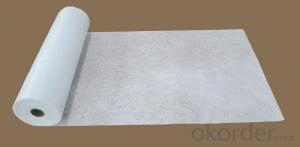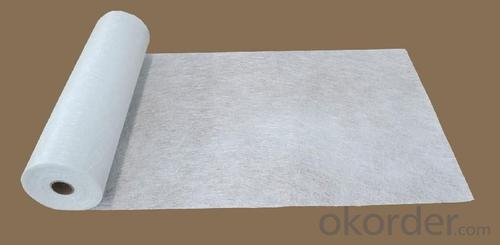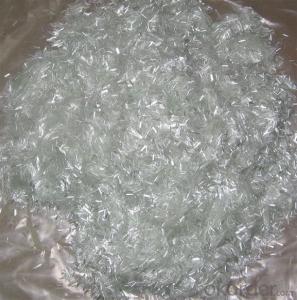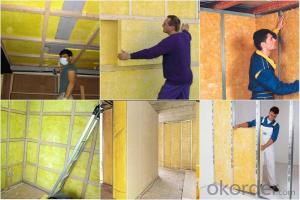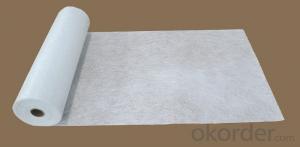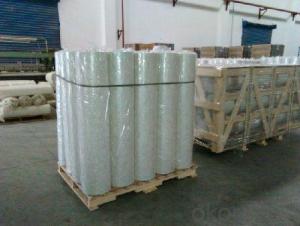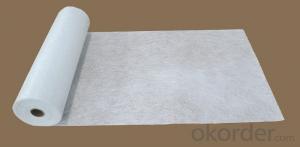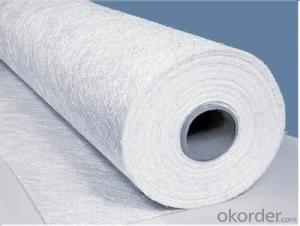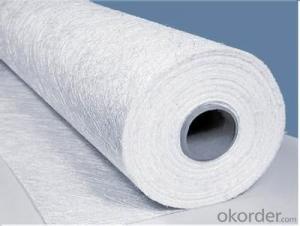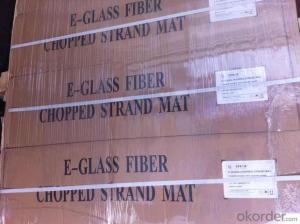Fiberglass Mat Tissue - e-glass Chopped Strand Mat (Powder Bonded)
- Loading Port:
- Shanghai
- Payment Terms:
- TT or LC
- Min Order Qty:
- 20000 kg
- Supply Capability:
- 200000Kg Per Month kg/month
OKorder Service Pledge
OKorder Financial Service
You Might Also Like
1.Brief Introductions
E-Glass Powder Chopped Strand Mat is made of randomly distributed chopped strands held together by a powder binder.
It is compatible with UP, VE, EP, PF resins.
The roll width ranges from 50mm to 3300mm.
Additional demands on wet-out and decomposition time may be available upon request.
2.Product Features
Good wet-through and fast wet-out in resins, rapid air lease
Superior acid corrosion resistance
3.Product Specifications
Property | Area Weight | Moisture Content | Size Content | Breakage Strength | Width |
(%) | (%) | (%) | (N) | (mm) | |
Property | IS03374 | ISO3344 | ISO1887 | ISO3342 | |
EMC80P | ±7.5 | ≤0.20 | 8-12 | ≥40 | 50-3300 |
EMC100P | ≥40 | ||||
EMC120P | ≥50 | ||||
EMC150P | 4-8 | ≥50 | |||
EMC180P | ≥60 | ||||
EMC200P | ≥60 | ||||
EMC225P | ≥60 | ||||
EMC300P | 3-4 | ≥90 | |||
EMC450P | ≥120 | ||||
EMC600P | ≥150 | ||||
EMC900P | ≥200 |
Special specification can be produce according to customer requirements.
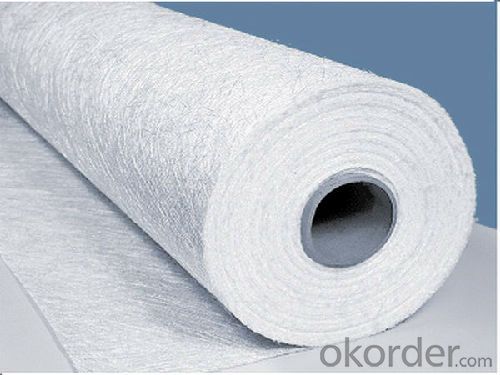
4.FAQ
Packaging:
Each Chopped Strand Mat is wound onto a paper tube which has an inside diameter of 76mm and the mat roll has a diameter of 275mm. The mat roll is wrapped up with plastic film,and then packed in a cardboard box or wrapped up with kraft paper. The rolls can be vertically or horizontally placed. For transportation, the rolls can be loaded into a cantainer directly or on pallets.
Storage:
Unless otherwise specified, Chopped Strand Mat should be stored in a dry, cool and rain-proof area. It is recommended that the room temperature and humidity should be always maintained at 15℃~35℃ and 35%~65% respectively.
- Q: What is the cost of fiberglass mat tissue?
- The cost of fiberglass mat tissue can vary depending on factors such as the thickness, size, and brand. It is best to check with suppliers or retailers for specific pricing information.
- Q: Is fiberglass mat tissue suitable for high-temperature applications?
- High-temperature applications are not suitable for fiberglass mat tissue. This type of tissue is usually composed of thin glass fibers interwoven to form a non-woven fabric. Although fiberglass is renowned for its robustness and endurance, it possesses a low melting point, rendering it unsuitable for withstanding high temperatures. Exposing fiberglass mat tissue to elevated temperatures may result in its melting or deterioration, leading to weakened structure and possible malfunction. Consequently, it is crucial to opt for alternative materials explicitly designed for high-temperature applications, such as ceramic or silicone-based products.
- Q: How does fiberglass mat tissue compare to other types of insulation materials?
- Fiberglass mat tissue stands out as an insulation material with distinct characteristics and benefits when compared to other options. To begin with, its thermal insulation properties are remarkable. With its low thermal conductivity, it effectively minimizes heat transfer between the inside and outside of buildings. As a result, it helps maintain cooler temperatures in summer and warmer temperatures in winter, leading to energy savings and enhanced comfort. Moreover, fiberglass mat tissue excels in sound insulation. It effectively reduces noise transmission through walls and floors, creating a calm and peaceful indoor environment. This is particularly advantageous in commercial buildings, where noise reduction plays a vital role in productivity and customer satisfaction. Notably, fiberglass mat tissue is lightweight and flexible, making it easy to handle and install. It can be easily tailored to fit around obstacles such as pipes and ducts, ensuring a tight and efficient insulation barrier. This simplifies installation, saving time and labor costs during construction or renovation projects. Another significant advantage of fiberglass mat tissue is its fire resistance. As a non-combustible material, it does not contribute to the spread of fire. This is especially crucial in buildings prioritizing fire safety, such as hospitals, schools, and residential properties. Furthermore, fiberglass mat tissue is durable and long-lasting. It does not degrade or lose its insulation properties over time, guaranteeing consistent energy efficiency and performance for many years. This durability makes it a cost-effective choice, reducing the need for frequent replacement or maintenance. Lastly, fiberglass mat tissue is environmentally friendly. It is manufactured using recycled glass and sand, decreasing the demand for raw materials. Additionally, it is recyclable at the end of its lifespan, reducing waste and promoting sustainability. In conclusion, fiberglass mat tissue offers exceptional thermal and sound insulation, effortless installation, fire resistance, durability, and environmental benefits. While other insulation materials may present their own advantages, fiberglass mat tissue remains a versatile and reliable option for diverse applications.
- Q: What is the fire rating of fiberglass mat tissue?
- The fire rating of fiberglass mat tissue can vary depending on its specific composition and intended application. However, fiberglass mat tissue typically has a good fire resistance rating due to the inherent properties of fiberglass, such as its high melting point and non-combustible nature. It is often used in fire-rated applications where fire protection is required.
- Q: Is fiberglass mat tissue suitable for insulation in educational facilities?
- Yes, fiberglass mat tissue is suitable for insulation in educational facilities. Fiberglass mat tissue is commonly used in insulation applications due to its excellent thermal insulation properties. It is a lightweight and cost-effective material that can effectively insulate buildings, including educational facilities, against heat loss or gain. Fiberglass mat tissue is also known for its fire-resistant properties, which is an important aspect to consider in any building, especially in educational facilities where the safety of students and staff is a top priority. Additionally, fiberglass mat tissue is easy to install and does not require extensive maintenance, making it a convenient choice for insulation in educational facilities.
- Q: Is fiberglass mat tissue suitable for construction applications?
- Indeed, fiberglass mat tissue proves to be a fitting material for construction purposes. Renowned for its robustness, longevity, and ability to withstand diverse environmental conditions, this versatile substance is frequently employed in roofing, flooring, insulation, and wall panel installations. Fiberglass mat tissue emerges as an exceptional selection for construction ventures as it bestows reinforcement and stability upon a range of materials. When incorporated into roofing materials, it fortifies them against impacts, weathering, and fires. Similarly, it bolsters the strength and durability of flooring systems, rendering them capable of withstanding substantial loads and heavy foot traffic. Moreover, fiberglass mat tissue exhibits commendable insulation capabilities. It serves as an efficacious insulating component for walls, ceilings, and floors, enabling the maintenance of a comfortable indoor temperature while diminishing energy consumption. Its thermal and acoustic insulation properties render it an ideal choice for construction applications. Furthermore, its imperviousness to moisture, chemicals, and corrosion makes fiberglass mat tissue a suitable option for deployment in areas characterized by high humidity or exposure to harsh chemicals. Thanks to its resistance to decay, it guarantees durability, ensuring longevity in construction projects. To conclude, fiberglass mat tissue is an apt choice for construction applications due to its strength, durability, insulation properties, and resistance to various environmental factors. Its adaptability and reliability have cemented its popularity within the construction industry.
- Q: Can fiberglass mat tissue be used in automotive applications?
- Yes, fiberglass mat tissue can be used in automotive applications. Fiberglass mat tissue is a lightweight, non-woven fabric made from fine glass fibers. It is commonly used in the automotive industry for various applications such as reinforcing composite materials, improving mechanical properties, and reducing weight. In automotive applications, fiberglass mat tissue is typically used in the production of fiberglass-reinforced plastics (FRP) components. These components include automotive body panels, interior trim parts, engine covers, and various structural parts. Fiberglass mat tissue is often used as a reinforcement layer in the manufacturing process to improve the strength, stiffness, and impact resistance of these components. Additionally, fiberglass mat tissue helps to reduce the weight of automotive parts while maintaining their structural integrity. This is particularly important in the automotive industry as reducing vehicle weight can lead to improved fuel efficiency and lower emissions. Furthermore, fiberglass mat tissue offers excellent corrosion resistance, making it suitable for automotive applications where exposure to moisture, chemicals, and harsh environmental conditions is expected. Overall, fiberglass mat tissue is a versatile material that can be effectively used in various automotive applications to enhance performance, reduce weight, and improve durability.
- Q: Can fiberglass mat tissue be used for making lightweight furniture?
- No, fiberglass mat tissue is not typically used for making lightweight furniture. It is primarily used as a reinforcement material in applications such as insulation, automotive parts, and construction, but not for furniture production.
- Q: Is fiberglass mat tissue resistant to chemicals?
- Yes, fiberglass mat tissue is generally resistant to chemicals. The composition of fiberglass mat tissue, which consists of fine glass fibers bonded together with a resin, provides it with excellent chemical resistance properties. This resistance allows the fiberglass mat tissue to withstand exposure to a wide range of chemicals without deteriorating or losing its structural integrity. However, it is important to note that the specific chemical resistance of fiberglass mat tissue may vary depending on the type and concentration of the chemical it comes into contact with. Therefore, it is always advisable to consult the manufacturer's guidelines or conduct appropriate testing to ensure compatibility with specific chemicals.
- Q: Can fiberglass mat tissue be used for making lightweight doors?
- Fiberglass mat tissue is a lightweight material commonly used in different industries due to its strength and durability. It consists of thin strands of fiberglass bonded together with a binder, resulting in a flexible and strong material. When utilized in door construction, fiberglass mat tissue offers multiple advantages. Firstly, its lightweight nature makes it perfect for creating doors that are easy to handle and install. This is particularly beneficial in residential or commercial settings where doors are frequently opened and closed. Moreover, fiberglass mat tissue possesses exceptional thermal and acoustic insulation properties. This means that doors made with this material can effectively block out noise and regulate temperature, resulting in a more comfortable and energy-efficient environment. Furthermore, fiberglass mat tissue is highly resistant to moisture, rot, and insects, making it a durable and long-lasting option for door construction. It can withstand harsh weather conditions, making it suitable for both interior and exterior doors. In conclusion, fiberglass mat tissue is a versatile material that can be used to create lightweight doors that offer strength, durability, insulation, and resistance to various environmental factors.
Send your message to us
Fiberglass Mat Tissue - e-glass Chopped Strand Mat (Powder Bonded)
- Loading Port:
- Shanghai
- Payment Terms:
- TT or LC
- Min Order Qty:
- 20000 kg
- Supply Capability:
- 200000Kg Per Month kg/month
OKorder Service Pledge
OKorder Financial Service
Similar products
Hot products
Hot Searches
Related keywords
